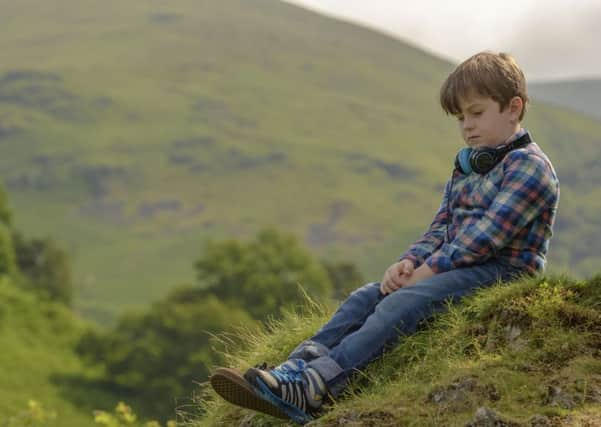One mother's open letter to those who stop and stare at her two autistic sons


It’s the third time you’ve turned around in as many minutes. I get it. My kids have bumped the back of your seat, whispered about what’s happening in the show and yelled out during the last song. It’s time for us to go. My other half and I gather up our family of five, along with their plethora of things, and hastily shuffle, carry and drag our kids out of the theatre.
As I walk past you holding our middle son, David, who looks too big to be carried, I bump your head with my rucksack. I look down at your face, blue in the hue that’s coming from the stage, and mouth “sorry.” Like I said, I get it.
Advertisement
Hide AdAdvertisement
Hide AdBut what I’d love for you to know is, despite the bumps and yells and us leaving before the show has finished, everyone here has done a great job.


It’s the time of year where couples, families and friends get together to enjoy the special activities that accompany our festive season. There’s Santa’s Grottos, parties and trips to the theatre. But for our family, these occasions can be challenging. My other half and I have three wonderful, kind and caring children – two of whom happen to be autistic.
It’s really important to us that Jane, our five-year-old daughter, gets the opportunity to do regular things, like a trip to the theatre. Having autistic siblings has definitely impacted on what we can take her too. She has been preparing to go to the theatre since we booked the tickets. In some ways, so have our boys.
Both Anthony, nine, and six year old David were diagnosed with autism around their fourth birthday. Anthony was also diagnosed with ADHD about two years ago. Despite sharing an autism diagnosis, my boys are very different people. Anthony goes to his local primary school, jumps around a lot and has difficulty understanding what people mean when they talk to him. David goes to a specialist school and, as his older brother so keenly observes, “has the kind of autism that means he doesn’t talk” - something he has in common with a quarter of all autistic people who are described as ‘non-verbal’.
Advertisement
Hide AdAdvertisement
Hide AdHowever, like Joe in the brilliant BBC series The A Word what my boys both share with each other and many people on the autism spectrum is a different way of interpreting the world around them. This often means they find new things difficult. They want to know what is going to happen, and will naturally gravitate towards things they know or which are familiar. This removes the unpredictability of life that makes them feel frightened.


As we arrived at the auditorium my boys didn’t look like they were interested in being at the theatre. Anthony was skipping about with his nose deep in an A5 paper booklet and David was immersed in playing with a very loud iPad. But these actions, as distant as they appear, were preparing our family for the day.
Anthony is easily confused by change. The rather random looking booklet he is holding is a breakdown of the show and about the theatre. It tells him where he is and what he is going to see. By skipping about and looking at it, he is doing a great job.
David has only been to a theatre a few times before. He is unsure of his surroundings and copes by focusing on something he is familiar with – his iPad. This helps him to take all the hustle and bustle at his own pace. I know he understands where he is, because he is playing a TV Christmas pantomime on the iPad. To others in the auditorium he may be a rude child playing on a loud iPad. Whereas to me, he was coping with his environment and doing a great job.
Advertisement
Hide AdAdvertisement
Hide AdWe sat in our seats at the end of the row, specifically reserved so we could leave if we needed to, and settled into the show. All the kids paid attention as the show started and although David spent most of the time standing, he’s so short it didn’t matter. I made a mental note that we may have to work on his ‘sitting’, or next time he’ll be blocking people’s view.


At the intermission, some of the stewards were selling ice-cream in little tubs. All our kids like ice-cream, but as with many things, buying some is not simple. I signalled to the steward who smiled and came over with their tray of little plastic tubs. There was a choice of flavours; vanilla, strawberry or chocolate. All our kids were first introduced to ice-cream via our local ice-cream van where they had a traditional white vanilla cone, with a flake. Anthony has over the years managed to understand that ice-cream comes in many forms. However, he’d still feel safest with a white ice-cream cone and flake.
We re-explained that there weren’t any ice-cream cones at the theatre and gave Anthony the flavour options. Anthony finds decisions very difficult. He’s never really sure of the consequences and worries about what might happen if he chooses the wrong thing. Giving him time to think helps and the more decisions he makes the easier it will be for him.
Jane had nearly finished her strawberry tub when Anthony asked if he could see the vanilla ice-cream to see if it was white or yellow. White vanilla ice-cream would be a winner. The kind steward opened up one of the tubs.
Advertisement
Hide AdAdvertisement
Hide AdThe yellow vanilla ice-cream stared back. He thought for a moment and then asked for the chocolate one. I smiled. And while David started to shout something that sounded like the word ‘chocolate’, Anthony ate his ice-cream. He was doing a great job.


David barely says any words. He’d heard the word ‘chocolate’ a few times in the ice-cream conversation and decided he would like some. As a reward for making efforts to talk David gets what he asks for. David only eats one kind of chocolate bar – it’s not one they sell at the theatre. I leaned into my enormous rucksack and found one. He sat beautifully and munched away. He was doing a great job.
It wasn’t long into the second act before the boys simply couldn’t focus anymore. To David the first and second act are much the same thing and he started to get a bit bored. Anthony was struggling to sit still and couldn’t follow what was happening in his book. Jane was getting tired. We’d had a good time but we were finished for the day.
And so, finally, to the folks sat in front of us. You didn’t judge at the iPad and booklet wielding kids. You waited patiently while our kids took five minutes to get ice-cream. And in the end, you were polite when we left. You were doing a great job.
Advertisement
Hide AdAdvertisement
Hide AdOne third of autistic people have been asked to leave a place because their behaviour is misunderstood. Even worse, half don’t go out at all because they fear they won’t be accepted, and will be asked to leave. I appreciate every time people show they care and don’t judge our kids or family. One day we may make it all the way through a performance. In the meantime, I’m extremely proud of the efforts all my kids make each time we go out. I’ll be sure to let them know, they all did a great job.
Ann Hickman writes a blog at rainbowsaretoobeautiful.com
This Christmas, we’re asking readers of The Yorkshire Post to help raise money so that people’s lives can be transformed through the work of Autism Angels.
The charity, based on a farm between Harrogate and Leeds, works with horses to help children with autism and their families.
WAYS TO DONATE
Cheques, payable to Autism Angels, can be sent to The Yorkshire Post Christmas Appeal, No1 Leeds, 26 Whitehall Rd, Leeds LS12 1BE.
Advertisement
Hide AdAdvertisement
Hide AdText Giving: Supporters can text £1, £2, £3, £4, £5 or £10 to Autism Angels by texting this code, YPAA22 followed by the amount to 70070. (eg: YPAA22 £10)
Just Giving: Visit www.justgiving.com/autism-angelsjg